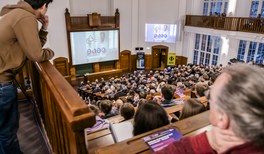The Quantum Year 2025 in Germany has begun
On January 14, 2025—coinciding with the 180th anniversary of the DPG—the Quantum Year in Germany officially kicked off with a public event at Humboldt-Universität zu Berlin. Around 450 participants attended in person, with nearly 400 more joining via livestream.
DPG President Klaus Richter drew particular attention to physicists from a wide range of countries who have had a decisive influence on the development of quantum physics in the years since 1925 and emphasized: “The extension of classical mechanics to quantum mechanics was certainly not a quantum leap, because quantum leaps are very, very small, but a real leap in knowledge: The way in which new scientific territory was explored and conquered here was simply revolutionary.” He also offered an overview of ongoing quantum activities in Germany and introduced a selection of upcoming public events.
Christoph Schneider, Vice President for Research at Humboldt-Universität zu Berlin, presented Berlin’s current quantum research network. “In a highly complex field such as quantum research, collaboration and the exchange of ideas are the key to success. Quantum mechanics has taught us that the world is more complex and multi-layered than we often imagine and that there is still much to discover and understand. Quantum Year 2025 is an opportunity to celebrate the achievements of the past and look to the future - and it is an invitation to everyone to engage with the fascinating concepts of quantum mechanics.”
Afterwards, Wolfgang Ketterle, Nobel Prize winner in physics, gave an insight into the impressive development of quantum mechanics. “Experiments on individual photons - Schrödinger would have thought that impossible. Now it is a great achievement of quantum science that we have managed to do experiments on single photons, on single atoms and also to have the atoms in a single quantum state.” As a further example, he explained the differences between earlier analog computers and today's development towards quantum computers and explained how they work based on QuBits - using the example of red and blue socks.
The subsequent panel discussion expanded on these topics. It was discussed that quantum physics takes place on the smallest scale, far removed from our everyday experiences, making its laws challenging to grasp yet deeply fascinating. Prospects for the development and future use of quantum computers were also discussed.
The scientific evening event “Quantum Legacies: Grappling with Quantum Theory over a Turbulent Century” took place at Magnus-Haus Berlin. In his keynote speech, science historian David Kaiser explained the circumstances and contexts of physics in the 20th century, which were also shaped by the Cold War, fascism and nuclear threats. He also focused on the interaction between the generations, as young physicists in particular - just in their mid-twenties like today's students and doctoral candidates - had a decisive influence on the development of quantum mechanics. This event was held under the patronage of the History Section of the DPG and the Physikalische Gesellschaft zu Berlin.
 Numerous events and initiatives planned for the Quantum Year 2025 have been made possible through the generous support of the Wilhelm and Else Heraeus Foundation.
Numerous events and initiatives planned for the Quantum Year 2025 have been made possible through the generous support of the Wilhelm and Else Heraeus Foundation.
